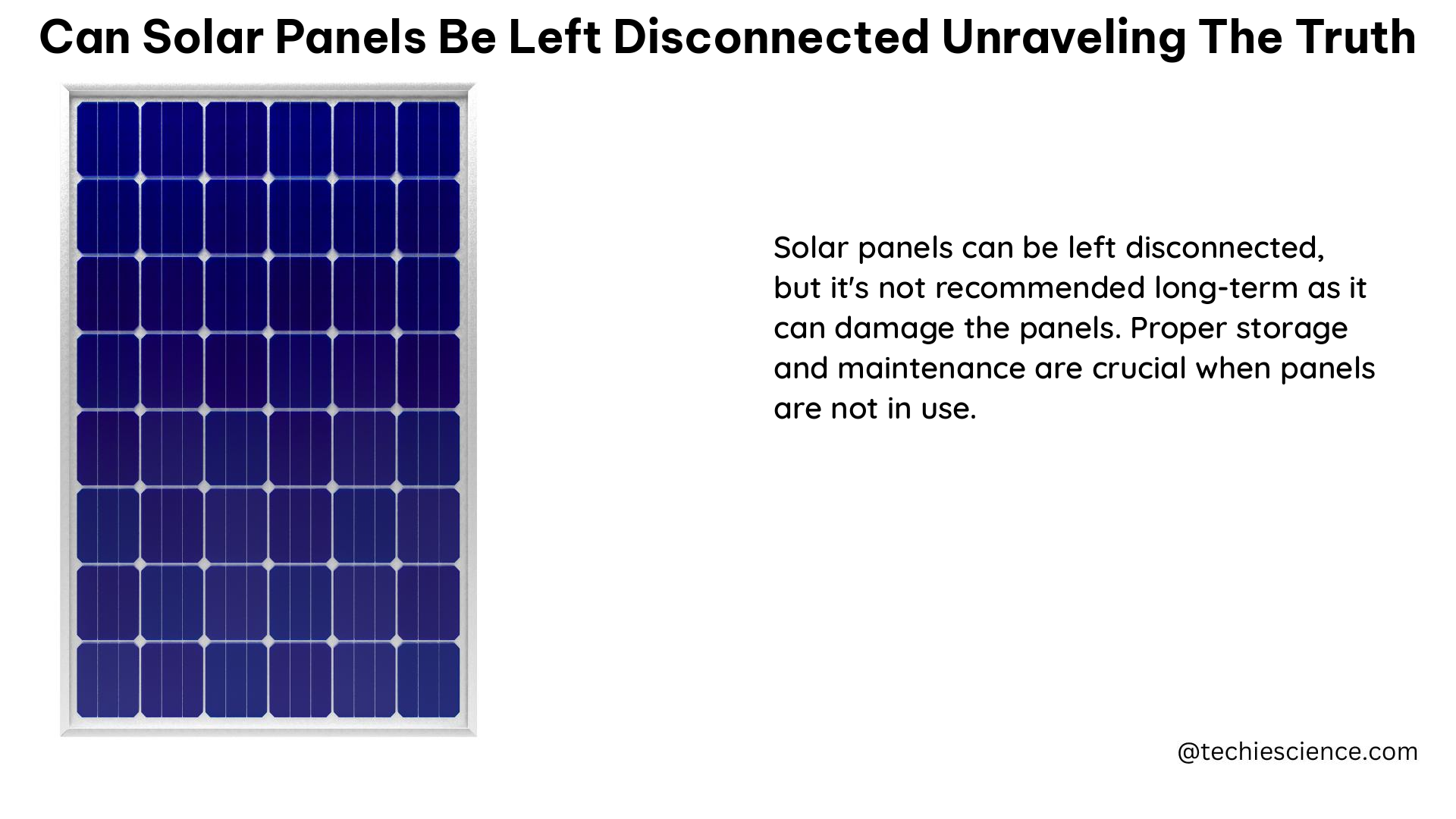The truth about leaving solar panels disconnected is that they will continue to generate a high voltage, but the energy will not be utilized unless an external load is connected. Solar panels are made of photovoltaic cells that convert solar energy into electricity, which can power devices directly or through an inverter for AC-powered appliances.
Understanding the Risks of Leaving Solar Panels Disconnected
Leaving solar panels disconnected for short periods of time is not harmful, but keeping them unplugged for long periods can damage their longevity. When solar panels are left disconnected, the photovoltaic cells continue to generate a high voltage, which can lead to the following issues:
-
Voltage Buildup: Without a load to dissipate the generated electricity, the voltage within the solar panels can build up to dangerously high levels, potentially damaging the internal components and reducing the overall lifespan of the panels.
-
Potential Arcing: The high voltage buildup can also lead to arcing, which is the formation of an electric arc between two conductive surfaces. This can pose a fire hazard and increase the risk of electrical shocks, especially in damp or humid environments.
-
Degradation of Components: Prolonged exposure to high voltages can accelerate the degradation of the solar panel’s components, such as the bypass diodes, junction boxes, and even the photovoltaic cells themselves. This can result in a decrease in the panel’s efficiency and overall performance.
-
Reduced Power Output: When solar panels are left disconnected, they are unable to convert the sun’s energy into usable electricity. This means that the potential energy generated by the panels is not being harnessed, resulting in a loss of power output and potential energy savings.
Proper Maintenance and Storage of Disconnected Solar Panels

To mitigate the risks associated with leaving solar panels disconnected, it is generally better to leave them connected and running, except for short periods like vacations or bad weather. If you do need to disconnect your solar panels, consider the following best practices:
-
Short-Term Disconnection: For short-term disconnection, such as during a vacation or a temporary power outage, it is generally safe to leave the solar panels disconnected. However, it is important to ensure that the panels are properly grounded to prevent any potential safety hazards.
-
Long-Term Disconnection: If you need to disconnect your solar panels for an extended period, it is recommended to take additional precautions to protect the panels and their components. This may include:
- Covering the panels with a protective tarp or sheet to prevent exposure to direct sunlight and reduce voltage buildup.
- Disconnecting the panels from the inverter or charge controller to prevent any potential damage to these components.
-
Storing the panels in a cool, dry, and well-ventilated area to minimize the risk of degradation.
-
Periodic Maintenance: Even if your solar panels are disconnected, it is important to perform regular maintenance to ensure their long-term viability. This may include:
- Cleaning the panels to remove any dirt, debris, or shading that could affect their performance.
- Checking the electrical connections and wiring for any signs of damage or deterioration.
- Inspecting the panels for any physical damage, such as cracks or delamination.
Technical Specifications and Considerations
In terms of technical specifications, a solar panel’s voltage can range from 12 to 48 volts, and its wattage can range from 100 to 400 watts. The panel’s current will depend on the amount of sunlight it receives and its efficiency, which is typically around 20%.
It’s important to note that covering solar panels is not necessary unless for extreme weather conditions, such as heavy snowfall or hail. The sun’s rays are free, and the 20% efficiency of solar panels means there is room for improvement in terms of energy conversion.
Conclusion
While leaving solar panels disconnected does not immediately harm them, it is not recommended for long periods due to potential damage to their longevity. It is generally better to leave them connected and running, except for short periods like vacations or bad weather. By following proper maintenance and storage protocols, you can ensure the long-term viability and optimal performance of your solar panels.
References:
- Leaving Solar Panels Disconnected: What You Need to Know
- Fact or Fiction: Bad Idea to Leave Unconnected Panels in Sun
- End-of-Life Solar Panels: Regulations and Management
- Sustainability Students Bring ‘Dead’ Solar Panels Back to Life
- My Very Conservative Aunt Shared This on FB. How Do I Respond?

The lambdageeks.com Core SME Team is a group of experienced subject matter experts from diverse scientific and technical fields including Physics, Chemistry, Technology,Electronics & Electrical Engineering, Automotive, Mechanical Engineering. Our team collaborates to create high-quality, well-researched articles on a wide range of science and technology topics for the lambdageeks.com website.
All Our Senior SME are having more than 7 Years of experience in the respective fields . They are either Working Industry Professionals or assocaited With different Universities. Refer Our Authors Page to get to know About our Core SMEs.